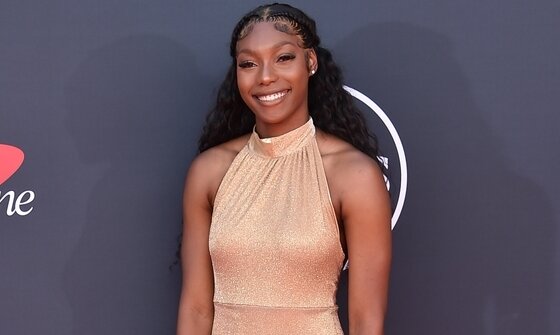When Angel Reese stepped onto the court this WNBA season, she brought more than rebounds—she brought receipts. The Chicago Sky forward didn’t just dominate the paint; she dominated the narrative. And when critics coined the term “mebounds” to mock her aggressive rebounding, accusing her of padding stats by grabbing her own missed shots, Reese flipped the insult into an income stream.
Not only do the actual stats tell a different tale, what haters intended for harm, Reese used for good.
According to her 2025 ESPN.com game log at the time of this writing, Angel Reese has grabbed a total of 157 rebounds while missing 77 field goals over the same period. Even in the most generous (and unrealistic) scenario—assuming she rebounded every single one of her own misses—those so-called “mebounds” would still account for less than half (approximately 49%) of her total rebounds. In reality, game footage and independent analysis reported by outlets like WGN and the Chicago Tribune confirm that only about 15% of her rebounds are off her own missed shots. That means the overwhelming majority of her boards come from classic hustle and elite positioning—not stat-padding. The narrative that she’s inflating her numbers doesn’t hold up under even basic statistical scrutiny.
Instead of pushing back, she filed forward: on June 15, 2025, Angel Reese LLC submitted a trademark application for “MEBOUNDS” with the United States Patent and Trademark Office (USPTO) in class 25 for goods like hats, t-shirts and sweatshirts. Just days later, she launched a merch line emblazoned with the term, proudly posting on social media: “MEBOUNDS. REESEBOUNDS. REBOUNDS… MERCH AVAILABLE NOW.” She added that part of the proceeds would go to the Angel C. Reese Foundation, supporting efforts to fight cyberbullying.
This is what I call an UNO Reverse moment—when people think you’ve got nothing left in your hand, and you hit them with a power play that changes the game. For Reese, the haters became unpaid brand consultants. For the rest of us, this moment is a teachable one about the power of ownership, the truth about trademarks and the strategy behind securing your story in the marketplace.
Trademark 101: What It Is and Isn’t
Let’s start with what a trademark is. According to the USPTO, a trademark is “a word, phrase, symbol, or design” (or combination thereof) that identifies the source of your goods or services and distinguishes them from others.
That means Reese doesn’t own the word “mebounds” in general. She is staking a legal claim to its use on specific types of merchandise. A common misconception (one that often makes its way into popular reporting) is that merely thinking of a catchy phrase gives you ownership. Not true. Nor is tweeting it or printing it on a T-shirt enough if someone else gets to the USPTO first.
Ownership follows action. You must use the mark in commerce and follow through with a formal trademark application process to secure broader, national rights.
Application ≠ Registration: Why the Process Matters
Contrary to what many headlines imply, Angel Reese doesn’t yet own a registered trademark for “MEBOUNDS.” She has filed an intent-to-use (ITU) application (also referred to as a 1(b) application, which is currently pending review by a USPTO examining attorney.
Here’s what happens next:
- Examination:
The USPTO attorney will review her application for accuracy, proper classification, and—most importantly—potential conflicts with existing registered marks. The key legal standard? Whether the mark is “likely to cause confusion” with another mark already in the market. Think McDowell’s vs. McDonald’s. - Office Actions:
If there are problems—say, the mark is too descriptive or conflicts with another—Reese’s legal team will receive an Office Action and have the opportunity to respond, argue, or amend. - Publication for Opposition:
If cleared, the mark will be published in the USPTO’s Official Gazette. For 30 days, third parties can file an opposition if they believe they’ll be harmed by the registration. - Registration or Notice of Allowance:
If there’s no opposition (or if one is defeated), and Reese can show evidence of actual use in commerce, the USPTO will issue a registration certificate. If she’s not using it yet, she’ll receive a Notice of Allowance and will have up to 36 months (with extensions) to submit a Statement of Use.
So for now, “MEBOUNDS” is a strong play in motion—not a done deal. And by the time a Notice of Allowance issues, Reese will be able to demonstrate “actual use” because she immediately began selling merch at her website.
Angel Reese is officially selling merch with the phrase "Mebounds" on it.
— The Sporting News (@sportingnews) June 20, 2025
Proceeds from the merch will go to the Angel C. Reese foundation to help combat cyberbullying.
(via @Reese10Angel) pic.twitter.com/Dmkvh8Y8i9
Using TM, SM and ® Correctly
Reese can already use the “TM” symbol next to “MEBOUNDS” on her merchandise. This signals her claim to trademark rights based on use, even before registration.
However, she cannot legally use the ® symbol yet—that’s reserved for fully registered marks. Misuse of the ® symbol can backfire if challenged. So, for entrepreneurs following her lead, get your symbols straight:
- TM – for unregistered trademarks used on goods
- SM – for unregistered service marks
- ® – only after federal registration is granted
“Mebounds” as a Business Model
In a now-viral TikTok video, Reese turned the term into a mantra: “Rebounds, mebounds, crebounds, kebounds, tebounds—anything that comes off that board, it’s mine… and our brand? That’s six figures right there.”
What she’s doing is more than savvy—it’s textbook brand ownership. By filing before others could squat on the term, and then launching real products with clear commercial intent, Reese isn’t just responding to online trolling—she’s building a moat around her narrative and monetizing the moment.
And she’s not the first to do so.
Ryan Coogler and the Power of IP Clauses
Filmmaker Ryan Coogler, director of Black Panther, made headlines in legal circles not just for his films but for the contractual clause he negotiated that automatically reverts copyright ownership of his original works back to him after a period of time. This isn’t standard. Most creators rely on the Copyright Act’s default termination provisions, which are complicated and take decades to activate.
Instead, Coogler set the terms up front. He contracted for control.
This is ownership at the negotiation table. Reese is doing the same in the public arena—filing for control before a term like “MEBOUNDS” ends up on knockoff merch from bad-faith actors.
Setting the Record Straight
Some headlines have overstated or misrepresented the legal significance of Reese’s move. Let’s set things straight:
- Filing a trademark doesn’t equal registration or final approval. It begins a review process that can take months or even years.
- Trademark protection doesn’t grant exclusive rights to a word in general. It protects the use of that word for specific goods or services in specific contexts.
- Being first to think of a phrase doesn’t give you rights—being first to file and use it in commerce does.
Why This Matters for You
Reese is teaching a free masterclass on brand strategy, whether she knows it or not. And here’s what we can all learn:
- Haters can be unpaid consultants. Use their energy to refine your brand voice and make your values visible.
- Words have value … when protected. Don’t just go viral. Go official. File.
- Don’t let the narrative run without you. Trademarks are a way of declaring, “This is mine. This is me.”
MEBOUNDS, REESEBOUNDS, REBOUNDS… MERCH AVAILABLE NOW! Part of the proceeds are going to go to the Angel C. Reese foundation to help fight against cyberbullying! SHOP NOW! ????????https://t.co/L5QjHGxw7e pic.twitter.com/vniCtHD7jy
— Unapologetically Angel (@angelreeseshow) June 20, 2025
Final Take: Play Your Uno Reverse
When people mock you, minimize you or meme you into a caricature, you’ve got two options: retreat or reclaim. Angel Reese played her Uno Reverse. Now the ball (and the brand) is in her court.
And if you’re building a business, a brand, or even just your online presence, let this be your reminder: you are the asset. Don’t just show up. Show up protected. In the inimitable words of Beyoncé, “best revenge is your paper”.











